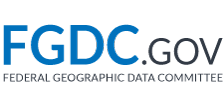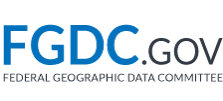Host: Janet Thot-Thompson, Multi-Sector Crisis Management Consortium (MSCMC)
Attendees:
Ivan DeLoatch, FGDC
Alison Kiernan, FGDC
Eric Goods, USACE
Ohsung Kwon, FGDC
Anne Frondorf, USGS
Paul Cutler, NRC
Bob Harding, GSA
Rick Pearsall, USGS
Lesley Ogrosky, FGDC
Brett Abrams, NARA
Tony LaVoi, NOAA
Monica DeAngelo, FERC
Travis Hardy, ESRI
Ingrid Milton, USDA/NRCS
John Moeller, Northrup Grumman
Bas Kok, RAVI
Jaap Berende, RAVI
Alan Stevens, FGDC Int'l
Donald Draper Campbell, FCC/OET
Kim Owens, NOAA
Myra Bambacus, NASA
Chris Clarke, NRCS/USDA
Milo Robinson, FGDC
Anne O'Connor, Census
Donna Scholz, FGDC
Rob Dollison, GOS/Orkand
Carol Brandt, USDOT/BTS
Tricia Gibbons, LEAD Alliance
Billy Tolar, National Atlas/USGS
Chuck Croner, CDC/DHHS
Jochen Albrecht, UCGIS
Ralph Crawford, USFS
Nancy Blyler, USACE
Tim Trainor, Census
Lee Warren, NGA
Bob Harding, GSA
Kim Owens, NOAA
Multi-Sector Crisis Management Consortium (MSCMC):
Janet Thot-Thompson, Executive Director of the Multi-Sector Crisis Management Consortium (MSCMC) welcomed the group and thanked Chuck Croner for hosting the Coordination Group at their Ballston facility. Chuck recently joined the MSCMC Board of Directors. The MSCMC is a program of the University of Illinois at Urbana-Champaign's National Center for Supercomputing Applications (NCSA). MSCMC addresses compatibility, portability, accessibility, and rapid deployment of new technologies to create a safer world. Government agencies, private sector companies and researchers involved in crisis management and response are members of the consortium. MSCMC was formed in 1998 and in 2000 became a nonprofit 501-3C organization with membership open to all local, state, and federal agencies, academic institutions, and the business community (both national and international).
The MSCMC has Access Grid technology - real time communication with shared applications over the Internet including audio, video, interactive tools, secure rooms and encryption. MSCMC's mission is to promote partnerships, collaboration, problem solving and technologies and is open to all sectors as a neutral convening forum to share problems and solutions. There is no threshold to the number of sites that can be accessed at one time. Membership in MSCMC is $100,000 for a 3 year commitment and the investment can be combined with others if you using the portal for a joint activity. The consortium has hosted ambassadors and heads of state and its representation is 35% private sector, 10% nonprofit, 11% international, 14% academia, and 30% government. For more information please visit: www.mscmc.org.
Transfer of Federal GIS Data to NARA - Brett Abrams, NARA
As part of the Electronic Records Management E-Gov Initiative, NARA is issuing guidance for transferring permanent electronic geospatial data records. NARA's Transfer Format Guidance for Geospatial Data calls for transferring permanent geospatial data to NARA in any open standard with a preference for SDTS and GML. The guidelines will be reviewed in a year after the SDTS and GML ISO revision processes. The requirements in the guidance became effective on April 15, 2004. NARA staff and records officers must determine what should be preserved. The standards are available at: http://www.archives.gov/records_management/initiatives/digital_geospatial_data_records.html.
Action: Program managers dealing with data related to citizen rights must send NARA their geospatial data in open standards.
Action: Please send Brett suggestions on how to best preserve historical geospatial data (brett.abrams@nara.gov)
Action: Please contact Robin Fegeas (rfegeas@usgs.gov) or Norm Andersen if you would like to participate in the SDTS 5 year revision.
RAVI - The NSDI of the Netherlands - Bas Kok & Japp Berends
RAVI is the FGDC/NSDI equivalent in the Netherlands and is part of the GSDI. Bas Kok is the Secretary General of RAVI. In 1999 RAVI and FGDC signed an MOU, although they had worked together since the early 1990s.
RAVI and the Dutch Department of Environment are creating a registration of contaminated soil sites. RAVI is also focusing on crime mapping and providing easily accessible information to citizens. Although RAVI has a strong and complete geodata infrastructure, improvements must be made in accessibility of data and interactions with citizens.
RAVI believes that the Netherlands has too much top down data, and should follow the example of the U.S. by creating frameworks and stimulating activities through private sector inclusion. U.S. governments are fostering freedom of information approaches and creating something like the Geospatial One-Stop policy is the direction that RAVI would like to head.
FGDC Future Directions - Ivan DeLoatch
The FGDC needs to examine its governance structure - the working groups, coordination and steering committees - in order to operate more effectively.
Tricia Gibbons stated that the Future Directions Report would be finalized tomorrow after the Coordination Group members sent in their final comments. She thanked those that had reviewed the draft and provided feedback. The Future Directions Report was written by Matt Shepard and Jon Sperling. Input was received from more than 150 people.
There was some difference in opinion on the dates used in the Action Plans. Some felt that the dates should be more immediate and that the 2010 dates were too far away, others felt that all of the action plans should have the same completion date and that 2010 should be it.
Detailed project plans will be developed after the June 15 Steering Committee meeting. ASPRS has volunteered to work on the business case activity. NSGIC has also volunteered to participate.
At the July 20 Coordination Group meeting (to be hosted by FCC) the action plans will be fleshed out and individuals will be named to act as champions. Please come to the July 20 meeting prepared. We have the expectation to carry out the Future Directions Actions and we need you to make a commitment to help the FGDC achieve this goal.
Next Coordination Group meeting:
July 20, 2004
Hosted by FCC in Washington, DC.

